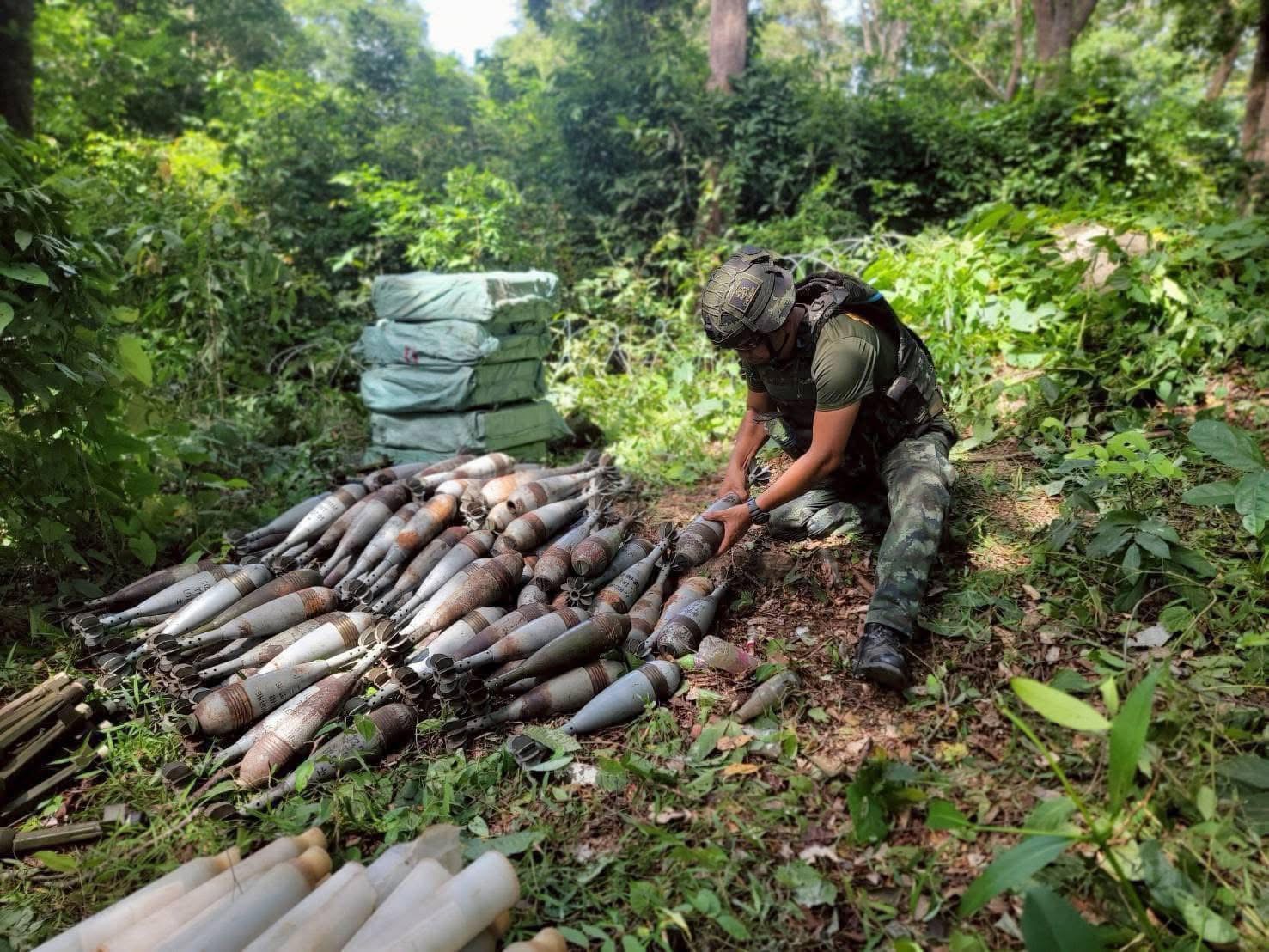In a month, at least 12 Thai soldiers have been injured in consecutive landmine blasts along the disputed border already, whereas Cambodia has repeatedly rejected the accusations, citing that the landmines are the remnants of war
Thailand’s Ministry of Foreign Affairs has revealed that Thailand is lodging a protest to the President of the Ottawa Convention and the Secretary-General of the United Nations against Cambodia following the fourth landmine blast that has caused another Thai soldier to lose his ankle, just three days after the third incident. According to the FA Minister, he has asked the Convention’s President to launch an investigation into the alleged use of landmines by Cambodia.
The MFA said Thailand is also calling upon the international community, including donor countries and international organisations which assist Cambodia in mine clearance, to reconsider their support in light of these repetitive incidents.
It also calls on the ASEAN community, a rules-based organisation, to urge Cambodia to abide by international law strictly. Furthermore, it requests that the Interim Observer Team, established under the decision of the GBC Meeting, give due consideration to this matter during its future field visits. This is crucial to ensuring the safety of the border area for innocent civilians of both countries, the MFA said.
And Thailand will also consider taking other measures of protest as deemed appropriate, the MFA added.

Yesterday, seven soldiers from Thailand’s 2610th Paramilitary Company were conducting a routine patrol in the Chong Chub Ta Mok area in Surin Province, but then came upon and stepped on yet another landmine, resulting in one soldier losing his ankle.
The third incident just occured three days ealier, on August 9, when another Thai soldier had lost his leg and his two other fellows injured. In total, four landmine blasting incidents have occured in a month, since July 16, that have injured several Thai soldiers already.
The Thai government once again condemns in the strongest terms the use of anti-personnel mines.
“Such action is yet another repetition of Cambodia’s insincere conduct, and an outright breach of international law, including the principles that are fundamental to the United Nations Charter, as well as a clear violation of the obligations under the Anti – Personnel Mine Ban Convention (Ottawa Convention) and international humanitarian law,” said the MFA in its latest statment issued yesterday.
“This incident, when taken together with the previous landmine incident on August 9, reflects Cambodia’s lack of good faith and contravenes the ceasefire agreement finalised by both sides at the Thailand-Cambodia Extraordinary General Border Committee (GBC) Meeting held on August 7 in Kuala Lumpur. Thailand, therefore, must again call on Cambodia to immediately cease these gross violations of the Ottawa Convention.”
The MFA stressed that Thailand reaffirms its commitment to fully implement the Ottawa Convention, while expressing its deep disappointment that Cambodia – having experienced the horrors of genocide and having previously committed itself to mine clearance in compliance with the Convention – has reverted to the inhumane use of such weapons against fellow human beings.

Third blast
Just three days earlier, the MFA had issued a statement representing the Thai government in condemning “in the strongest terms the use of anti-personnel mines” following the blast in the border area in Si Sa Ket province.
On August 9, just two days after the GBC meeting, three soldiers from Thailand’s 1st Infantry Battalion, 111th Infantry Regiment, were conducting a routine patrol within Thai territory that was recently cleared of landmines near the Don Aow-Kritsana area, but then came upon and stepped on another landmine. One of the soldiers has lost his left foot and had to cut his leg. They were sent to hospital for intensive treatment.
The MFA said the incident, marking the third such incident encountered by Thai forces within less than a month, confirmed the previous investigation reports of the Thai Army that new landmines were being laid in blatant violation of international law.
“The Royal Thai Government condemns in the strongest terms the use of anti-personnel mines. Such an act is a clear violation of the sovereignty and territorial integrity of the Kingdom of Thailand, which is an outright breach of the principles that are fundamental to international law and international humanitarian law enshrined in the United Nations Charter, as well as a clear violation of the obligations under the Anti – Personnel Mine Ban Convention (Ottawa Convention),” stated the MFA in its statement.
Such actions by the Cambodian side pose a significant obstacle to the implementation of the ceasefire agreed upon by both sides, the MFA further noted. Thailand, therefore, must repeatedly call on Cambodia to immediately cease these gross violations of the Ottawa Convention by laying new landmines and urgently cooperate on humanitarian demining efforts along the border of the two countries, as bilaterally agreed upon by both Prime Ministers.
Thailand earlier proposed cooperation in the clearance of landmines along the border with Cambodia at the GBC meeting in Malaysia, but Cambodia did not respond to its proposal. The other proposal concerning cooperation in combating transnational crime, especially online fraud or online scams, was also rejected by Cambodia, as it cited a focus on the ceasefire efforts.
Major General Winthai Suvaree, Army spokesperson, stated that this incident clearly demonstrates to both domestic and international society that the use of concealed weapons in border areas continues to exist, constituting a clear violation of the Ottawa Convention by the Cambodian side.
This is consistent with the report it received on August 4, when a military engineer unit conducted area clearance and security enhancement operations at Phu Ma Kheua, Kantharalak District in the same province, which had previously served as a Cambodian military’s stronghold.
During the inspection, the unit found 18 PMN-2 anti-personnel landmines: 16 mines packed in sacks in non-explosive condition and 2 mines hastily placed without complete burial in explosive-ready condition. The military engineer unit successfully recovered all 18 mines.
Additionally, numerous grenade launcher rounds and RPG rockets were also found at the site, according to the RTA.



Anti-personnel landmines and RPG rockets were found on August 4 in Phu Ma Kheua, Kantharalak District, once the Cambodian military’s stronghold. Photos courtesy of RTA
Thailand’s repeated calls
Following the landmine blasting incident on August 9, Thailand, through its Permanent Representatives of Thailand to the United Nations Office in Geneva and the United Nations in New York, had approached and called on the President-designate of the Convention’s 22nd Meeting, the UN Secretary-General, and other high-level representatives of several state parties and relevant CSOs to “take actions” in response to Cambodia’s repeated violations of its obligations to the Convention.
The Convention’s Committee on Cooperative Compliance has also heard the facts and information regarding the incidents from the Thai representatives. Related procedures remain ongoing in accordance with the relevant mandates, the MFA said.
Thailand has experienced the blasts of anti-personnel landmines allegedly planted by Cambodia along the disputed border four times already. The first incident took place on July 16. The second incident took place just a week later, on July 23, one day before the confrontation reached its peak, resulting in widespread military clashes along an 800-km shared border.
They were in the Chong Bok area, Ubon Ratchathani Province, the Chong An Ma area, Ubon Ratchathani Province, and the Chong Don Ao–Krisana area in Kantharalak District, Si Sa Ket Province, respectively, before the latest one occurred in Chong Chub Ta Mok in Surin.
The four landmine blasts have resulted in 12 Thai soldiers being seriously injured so far.
The UN’s Ottawa Convention, or fully named as Convention on the Prohibition of the Use, Stockpiling, Production and Transfer of Anti-Personnel Mines and on their Destruction, was first concluded by the Diplomatic Conference on an International Total Ban on Anti-Personnel Land Mines at Oslo on September 18, 1997.
According to the Convention’s website, the Convention entered into force in March 1999. Currently, there are 165 States Parties to the Convention. Thailand became a State Party in 1999, the first country in Southeast Asia, and completed the destruction of all stockpiled anti-personnel mines in 2003, as well as those retained for research and training purposes in 2019. Cambodia became a State Party in 2000 and continues to retain anti-personnel mines for research and training purposes, including PMN-2 type mines.
Under the Ottawa Convention, States Parties are prohibited from the use, stockpiling, producing, or transferring anti-personnel mines, and are required to destroy anti-personnel mines in accordance with the provisions of the Convention.
Since the first incident took place, the Permanent Representative of Thailand to the United Nations Office in Geneva has submitted three letters to the President-designate of the 22nd Meeting already. In the first letter, dated July 23, Thailand notified Cambodia of a violation of Article 1 of the Convention (prohibition on the use or stockpiling of anti-personnel mines) in the Chong Bok area, Ubon Ratchathani Province, during a routine patrol.
The result of the investigations by the relevant Thai authorities confirmed that the landmine stepped on by Thai military personnel was recently planted and identified as a PMN-2 type, which was in Cambodia’s possession. In this regard, Thailand requested that the letter be circulated to all States Parties to ensure that they were duly informed of Cambodia’s violation, the MFA stated.
In the second letter, dated July 24, Thailand notified Cambodia of a repeated violation by Cambodia in the Chong An Ma area, Ubon Ratchathani Province. Thailand also informed that on the same day at 8.20 am, Cambodia committed an act of aggression in violation of the sovereignty and territorial integrity of Thailand by carrying out indiscriminate armed attacks against Thailand’s territory, resulting in humanitarian consequences and constituting a violation of international law, including the UN Charter and international humanitarian law.
In this regard, Thailand requested that the letter be circulated to all States Parties to ensure that they were duly informed of Cambodia’s violation.
In the third letter, dated August 9, Thailand notified Cambodia of a violation of its obligations in the Chong Don Ao – Krisana area in Kantharalak District, Si Sa Ket Province, which had previously been cleared of landmines. The result of the investigation suggested that the landmine was recently planted, which constitutes a gross violation of international law, according to the MFA.
“Regrettably, this incident also occurred just two days after the Extraordinary General Border Committee (GBC) Meeting in Kuala Lumpur, during which Thailand proposed the inclusion of joint demining operations, as earlier agreed upon between the Prime Ministers of the two countries.
“Unfortunately, Cambodia declined to accept Thailand’s proposal. In this regard, Thailand has requested that the letter be circulated to all States Parties to ensure that they are duly informed of Cambodia’s violation,” the MFA stated.
The Permanent Representative of Thailand to the United Nations in New York, on the other hand, also submitted a letter dated July 24 to the UN Secretary-General, requesting for clarification from Cambodia on the acts that constituted a violation of the Ottawa Convention, in accordance with the compliance mechanism under the Convention, under Article 8, paragraph 2, of the Convention.
It stipulates that a State Party may seek clarification to resolve questions related to compliance with the provisions of the Convention by another State Party through the UN Secretary-General. In this regard, Cambodia is obliged to provide information and clarification to Thailand through the UN Secretary-General, according to the MFA.
Cambodia, meanwhile, has rejected Thailand’s allegations, principally citing that the landmines are remnants of the war, and Thai soldiers have patrolled outside their regular tracks.
In the latest incident, TMAC has found three more newly planted landmines in the same blasting area. They were all in the Thai territory, according to the 2nd Army Area.
Indie • in-depth online news agency
to “bridge the gap” and “connect the dots” with critical and constructive minds on development and environmental policies in Thailand and the Mekong region; to deliver meaningful messages and create the big picture critical to public understanding and decision-making, thus truly being the public’s critical voice


